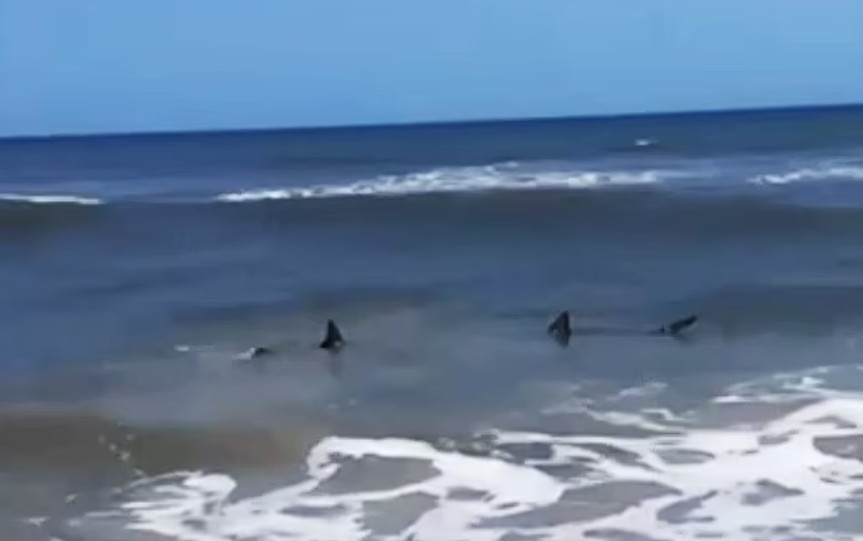
Sharks spotted in knee-deep water in Florida have sent beachgoers sprinting from the water, marking the latest incident of an uptick of sightings of the massive predators along the US northeast shorelines.
On Saturday afternoon, Kara Skonieczny was at Neptune Beach in Jacksonville and was quick to whip out her camera and grab footage of a pair of sharks who had pulled up into the shallow water, Fox 13 first reported.
The sighting quickly sent some swimmers sprinting for the shore, as one person in the video shared online can be heard shouting, “get out of the water”.
The plea, however, was not heeded or heard by all, as some of the beachgoers can be seen continuing with their ocean dip, only metres away from where the sharks’ fins are seen popping out of the water.
While Saturday’s sighting of the pair of sharks at the north Florida beach was jarring, it was by far the less dangerous event involving the big fish that occurred that day in the region.

On the same day at Jacksonville Beach, located about two miles south of where the pair of sharks were spotted, a man was reportedly severely injured after being attacked by what lifeguards suspect – but can’t confirm – was a shark.
At around 12pm on Saturday, Robert Alexander, a witness to the attack, told News4JAX that he began hearing people shouting at the popular beach destination when he saw a man in the water waving his hands for help.

Shortly after, a lifeguard rushed into the water to assist the man, as did Mr Alexander, who described to the local news outlet how he saw a large amount of blood encircling the man’s body when he began to approach him before he saw what he believed was the large shadow of shark, coasting by the group about 10 ft away.
“I started splashing, making a lot of loud noises and next thing I know it was kind of tunnel vision, and I grabbed him, put him on his boogie board,” Mr Alexander told the local news station.
They were able to pull the man, who has not been identified, to shore, but his leg where the suspected predator had taken a bite from the swimmer – from the shin down to his foot – was reportedly “pretty much in shreds”.
“His foot was dangling as we were carrying him to shore. You could tell he had no movement in his foot,” Mr Alexander said, adding that it took a nurse and additional lifeguards to help attend to the man once he was on shore.
According to Ocean Rescue, they are considering the incident a “possible shark bite”, but since no one at the scene saw the actual creature responsible for the man’s wounds, they could not certify that it was indeed a shark attack.
As of Sunday morning, the man injured on Saturday was still in hospital being treated for “severe injuries”.
In recent years, the number of shark sightings off the shore of east coast beaches has increased, leading local governments to issue warnings, closures and even mandate additional monitoring.
For instance, in New York, local news outlets estimate that there’s been at least five non-fatal shark attacks at Long Island beaches in the past month, with two instances of reported bites occurring within 11 hours of each other.
The uptick in shark sightings has even prompted New York Governor Kathy Hochul to issue a directive to agencies, including the Office of Parks, Recreation and Historic Preservation, the State Police and the Department of Environmental Conservation, to enhance surveillance of the waters and shoreline from as many angles as conceivable.
The governor requested the addition of more drones and helicopters for monitoring the situation from above, while also requesting more foot and water patrols in affected areas on the ground.
Though locally there’s been an increase in the number of sightings of sharks, unprovoked shark attacks around the world remain a rarity. Globally last year, there were 73 unprovoked attacks – defined as a human being getting bit whilst swimming in a shark’s natural habitat without provocation – and 39 provoked bites, according to the International Shark Attack File.







